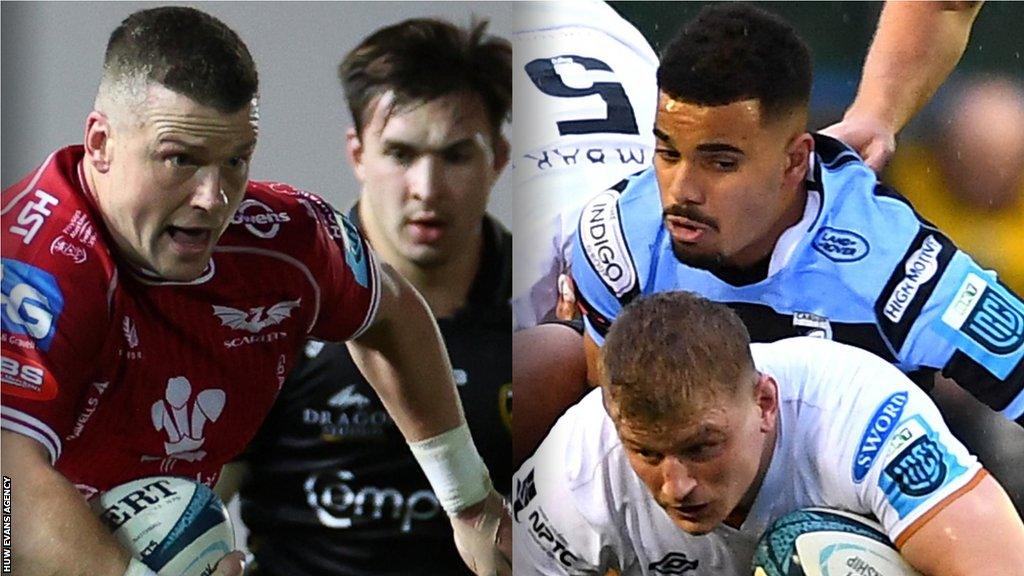Welsh rugby's latest crisis and possible player strike explained
- Published

Players at Wales' rugby regions face an uncertain future
Welsh rugby's financial crisis is coming to a head with players considering the option of going on strike in the build up to Wales' Six Nations game with England.
It is the latest twist in a turbulent time in the game in Wales, coming just weeks after the resignation of Welsh Rugby Union (WRU) chief executive Steve Phillips amid allegations of sexism, misogyny and racism in the game's governing body.
Now an ongoing impasse over contracts and finances in the regional game is threatening to spill onto the international stage with players questioning whether to walk out ahead of their home clash with old rivals England in Cardiff on Saturday, 25 February.
The situation has left fans wondering what will happen next. BBC Sport Wales tries to explain how Welsh rugby reached this point.
Why are players considering a strike?
It's not just about the money, although that is also a consideration. Around 70 players - including some current Wales Six Nations squad members - are out of contract at the end of the 2022-23 season.
As former Wales lock Andrew Coombs has highlighted on social media, those players are vulnerable to a significant injury leaving them jobless in June.
"Players should not be playing without a signed contract in front of them," said Coombs.
"One big injury and they will be jobless with no medical support! I know that feeling well and would not wish it on any other player."
Financial cuts will also be imposed at the regions - Cardiff, Ospreys, Scarlets and Dragons, adding to contract uncertainty.
Amid the swirl of the contract impasse and impending cuts, a new six-year framework between the WRU and regions has not progressed to a full and formal agreement.
So players are left unsure of their financial futures with only one certainty on that front - pay packets will be a lot lighter than has been the case.
Why are players unable to sign contracts?
Since the beginning of January the professional teams have been able to make verbal offers to players, but without a solid deal between governing body and regions having been signed, no offers can be put into writing and accepted or rejected.
The regions themselves must agree on the formula for how money distributed via the WRU is divided up.
Without financial clarity, the regions are unable to finalise budgets so cannot offer fresh contracts.
The vast majority of players have contract beyond the end of 2022-23, but how they might be impacted by cuts in the short term is unclear.
Is the England game seriously at risk?
Maybe. The WRPA will meet next week, in the days leading up to Wales v England with a strike among the options to be discussed.
For it to go ahead, Wales' leading, high profile players would need to back a walk-out surrounding issues of greater concern to mid-ranking players.
Hosting England is Wales' biggest game of this season and the millions of pounds it is expected to generate for Welsh rugby coffers is on the line - a big call for all involved.
What else could players do?
Leaving Welsh rugby is always an option. Dragons' Wales lock Will Rowlands has set the example this season and will play in France in 2023-24, risking his chance to play at the 2023 World Cup.
Like Rowlands, Ospreys fly-half Gareth Anscombe is injured and reportedly leaving Wales at the end of the season while Scarlets and Wales hooker Ryan Elias is the subject of similar speculation.
Cardiff director of rugby Dai Young said Welsh rugby "cannot be arrogant" in assuming players will not go elsewhere while he and his counterparts have also regularly bemoaned the lack of progress.
However, some of those who will come out of contract could face a difficult jobs market.
There are two fewer teams in English rugby's top flight following the demises of Wasps and Worcester Warriors.
A reduced salary cap in England has prompted player movements to France, but in both those countries there are restrictions on the numbers of non-nationals playing at professional club level. Similar rules are in place in Wales.
Who is involved in talks?
The WRU, the Professional Rugby Board (PRB) and the WRPA.
Interim WRU chief executive Nigel Walker sits on the PRB, which also consists of four regional representatives - Alun Jones (Cardiff Rugby), David Buttress (Dragons), Chris Lawlor (Ospreys), and Simon Muderack (Scarlets) - plus WRU finance director Tim Moss and two independent members, independent chair Malcolm Wall and Marianne Okland.
Ashton Hewitt is WRPA chairman, also representing Dragons on its executive committee alongside George Nott. Cardiff are represented by Lloyd Williams and Ellis Bevan, Dan Evans and Scott Baldwin are Ospreys' pair while Rhys Patchell and Scott Williams speak on behalf of Scarlets.
What has WRU said?
On the day he became WRU interim chief executive Nigel Walker said all player contracts were likely to be completed by the end of February, 2023.
That assertion came after the December 2022 announcement of the new six-year framework involving the nation's four professional teams aimed at resolving the game's long-standing financial issues.
Walker met with senior members of the Wales squad on Wednesday to "further clarify the current position".
He said later in a statement released by the PRB that the board has "absolute empathy with the professional players in Wales and are hugely grateful for all that they do for our national game".
"We know we are not in an ideal situation, but it is incredibly important for the whole game in Wales for us to get this next step right," he added.

